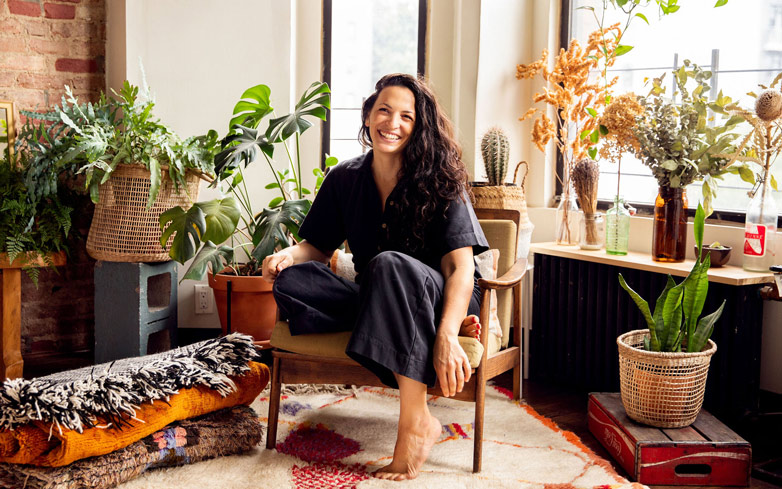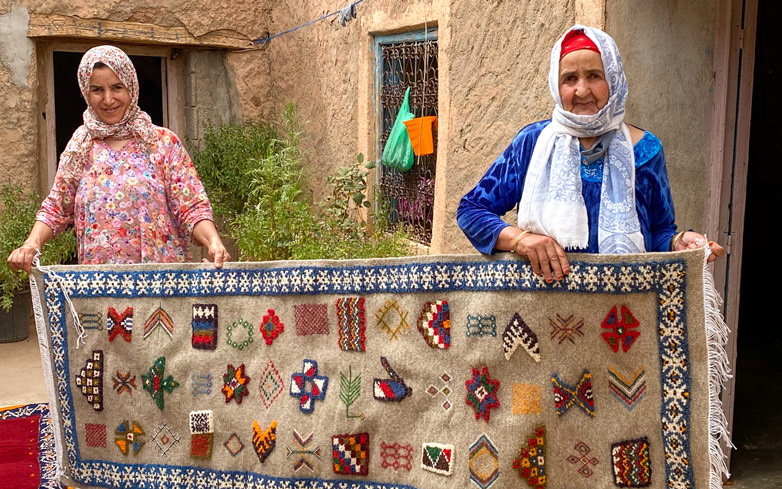How Mallory Solomon’s Textile Business Is Making a Difference for Women Artisans

Mallory Solomon was in the midst of a hard year of work — with barely a day off — at one of the world’s top creative agencies, winning over clients that are household names, when she booked a vacation that would change her life. Despite all her successes, something in Mallory’s life didn’t feel right; ever since she was a girl, she’d had this burning desire to run a business, and moving high up the ladder in advertising wasn’t making it go away.
The Birth of Salam Hello: Fair-Trade Moroccan Textiles
Mallory booked herself a 2-week dream vacation in Morocco and when she landed, “I immediately felt at home,” she recalls. “During my time wandering the streets, villages, and various medinas, I did what any tourist does. I went textile shopping, and it was at that moment that I started to have the idea for Salam Hello.”
Upon her return to New York City, she did a deep dive into the history of Moroccan textiles. She was fascinated to learn that women there had been handweaving textiles since 600 BC, passing the craft from generation to generation by way of mouth and guided hand.
“They carry this tradition with them as they work, telling new stories with each knot of every textile. These women can easily spend months, or even years on these pieces, often as they raise children and run households,” explains Mallory. “They are invaluable works of art. But when it comes time to sell, the stories behind these textiles are lost to bulk buyers, and the artisans are at the mercy of middlemen.”
The women who weave these stunning pieces are often left out of negotiations. As a result, they rarely earn what they’ve invested in time, material and craft.
“Traveling in coordinated packs, buyers come to the villages to purchase rugs and one after another, each broker will tell an artisan that her price is too high. With each unsuccessful meeting, she is forced to lower her price,” explains Mallory. “Finally, a broker will buy the rug at less than 50% of fair cost, barely covering the artisan’s time and materials. When the brokers return to the souks, they sell to souk owners with a drastic markup and pocket a huge profit. The souks will then sell to tourists or other brands with yet another markup.”
The business Mallory finally founded, Salam Hello, was created to be a transparent and empowering outlet for Moroccan artisans — a far cry from the system she and so many tourists before her had supported.
How Salam Hello is Making a Difference for Women Artisans
Determined to spark real change, Mallory wrote a business plan, then flew back to Morocco and started connecting with the women behind this craft.
“Salam Hello needed to work differently. We needed to pay these women a fair wage. We make it our mission to meet with every woman selling each piece and they help us understand the time, labor, and story behind the weave,” she says. “Since many of the artisans live in the same location where they weave and sell, meeting women is a very fluid process. We do our best to travel to the villages we know have a deep-rooted history in weaving and talk with the locals who point us to the right family or association who are still weaving and looking to sell their goods.”
By now, Mallory has built an entire team, which meets these women — and they tend to spend hours together. Again, the goal is to ensure that they feel comfortable with the organization, and that their background and history is organically, wholly conveyed. They also want to understand every detail that goes into each one-of-a-kind piece, so it’s sold at a fair price.
“On average, we are paying the artisans a minimum of 40% of the final sale price. That percentage excludes our 10% profit reinvestment in the women,” says Mallory. “The range of costs depends on how many people it took, time invested, materials required, and whether or not the product is vintage. Given our industry insights, what we pay our artisans is at least triple what they would receive under the historic industry structure.”
Giving back is built into the business, though it flexes to give women whatever they need; some have asked for donations or materials, others just ask that Salam Hello returns and continues to buy from them. Recently, the community of weavers in Anzal was supplied with the digital camera they requested. And in Tazenakht, the company provided one family an additional 10% of profit in cash, as well as resources to help them adapt to the ever-changing education system during the COVID-19 pandemic.
Looking Forward with Salam Hello
“Starting your own business is a roller coaster of emotions. It’s a crazy, invigorating ride,” says Mallory. “The challenge that is a constant for me is to ensure I’m respectfully walking the line of empowering these artisans to be the confident businesswomen that they are while not wanting to force any western ideal of what we might think empowerment should be and/or look like.”
Moving forward, Salam Hello has prioritized ensuring they’re respecting the women and their family, culture, and beliefs. They understand this is critical to their success and will be for any future business in the fair-trade space.
You can learn more about Salam Hello here.







